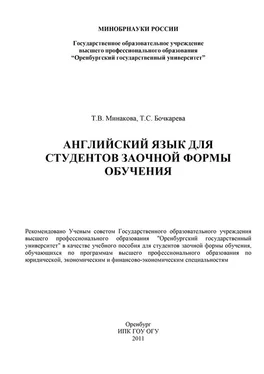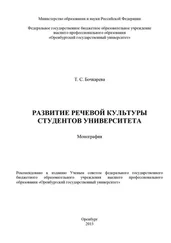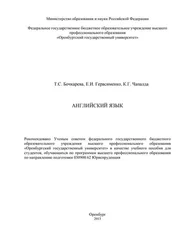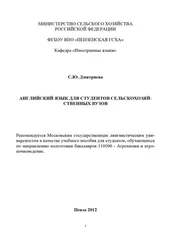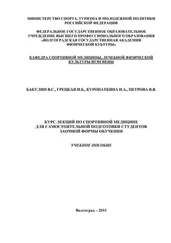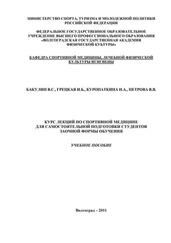Accountants report financial information on a periodic basis, that is, at regular intervals. The frequency of communicating varies according to the needs of the user and the nature of the information reported. For example, the company's treasurer may request daily reports of cash, the sales manager may require weekly reports of sales, and the president may desire monthly reports of operations as a whole. In contrast, annual statements of financial position and results of operations may be suffice for investors and governmental agencies.
The information is reported to the users of financial reports through ratios, percentages, graphs and charts.
2.2.2.3 Задание 3. Ответьте на вопросы по текстам А, В, С
1 Is accounting part of a financial information system?
2 What parts does the process of accounting consist of?
3 What examples of economic events can you give?
4 Identifying involves selecting of economic events relevant to a particular organization, doesn't it?
5 Can all the events be quantified in monetary terms?
6 What events are not considered part of the company's financial information system?
7 Does the accountant only record the measured events in a systematic manner?
8 What else does he do with the measured economic events?
9 Where do accounting records date back to?
10 Why did the rulers of ancient civilization of China, Babylonia, Greece and Egypt use accounting?
11 What was Luca Pacioli?
12 What spurred the development of accounting in the nineteenth century?
2.2.2.4 Задание 1. Прочитайте и запомните следующие слова и словосочетания:
transactions – сделки;
to carry on – проводить;
to provide – обеспечивать;
mutual savings banks – взаимно- сберегательные банки;
lending – предоставление кредита;
loans – займы;
creditworthiness – кредитоспособность;
acceptance – принятие;
transfer – передача, перевод;
deposits – депозиты;
vaults – хранилища;
to store – хранить;
to insure – страховать;
valuables – ценности;
profitable – выгодный;
interest – процент;
percentage return – доход в виде процента;
account debit cards – карты дебета счета;
electronic cash till – банкомат;
computer on-line banking – компьютерные онлайновые расчеты между банками;
clearinghouses – расчетные палаты;
payments – платежи;
income – доход;
savings – сбережения;
yield – доход;
mortgage – ипотека;
facilities – средства;
handling – обработка;
checking account – 1) специальный счет, с которого снимаются деньги по чекам клиента; 2) счет, позволяющий в любой момент вносить и снимать деньги (до востребования);
rate of interest – процент, процентная ставка, норма процента;
liabilities – задолженность;
assets – актив (баланса);
retail bank – банк, занимающийся обслуживанием мелкой клиентуры;
underwriter – гарант размещения (займа, акций и т.п.);
issue of shares – выпуск акций; intermediary – посредник;
merger – слияние, объединение (коммерческое, промышленное и т.п.);
acquisition – 1) получение; 2) приобретение (действие); сбор;
building society – жилищно-строительное общество;
management buy-outs – выкуп права на управление.
2.2.2.5 Задание 2. Прочитайте тексты А, В, переведите их письменно
Text A. What Is Banking
Banking is the transactions carried onby any person or firm engagedin providingfinancial services to consumers or businesses.
For these purposes there exist commercial banks, central banks, savings banks, trust companies, finance companies and merchant banks. Banking: consists of safeguardingand transfer of funds, lendingor facilitatingloans, guaranteeing creditworthinessand exchange of money. In other words, banking is the acceptance, transfer,and creation of deposits.The depository institutions are central banks, commercial banks, savings and loan associations, building societies, and mutual savings banks.
Safeguarding and transfer of funds
Vaultsand safes are the means for safeguarding of funds. Money is physically storedthere. These physical deposits are in most cases insuredagainst theft,and against the bank being bankrupt and unable to repay the funds. In some banks customers can use safety deposit boxes for valuables.To save money in banks is profitablebecause bank customers receive interest given on savings accounts, a percentage returnon the bank's investments with the money.
Transfer of funds can be handled through written instruments: contracts, cheques, or direct transfers performed electronically. Nowadays banks provide the customers with additional ways of gaining accessto their funds and using them. These are credit cards and account debit cards, electronic cash tills, computer on-line banking,and other services.
Automated clearing houses perform similar services for business customers by handling regular payments,such as wages, for a company banking with the bank.
Longer-term schemes for providing regular incomeon savingsare often offered through trust funds or other investment schemes.
Lending and loans
Loans to bank customers are drawn onthe funds deposited with the bank and yieldinterest which provides the profits for the banking industry and the interest on savings accounts. These loans may take the form of mortgagesor other policies.Banks may guarantee credit for customers who wish to obtain loans from other institutions. They also provide foreign exchange facilitiesfor individual customers, as well as handlinglarge international money transfers.
Text B. Banks
Banks are organizations that carry out the business of banking, taking deposits and then using those deposits to make loans. In essence, a bank aims to make a profit by paying depositors a lower rate of interest than the rate the bank charges borrowers. In accounting terms, deposits are considered liabilities (because they have to be repaid), and loans are considered assets.
Banks in most countries are supervised by a central bank, such as the Bank of England in the United Kingdom, the Bundesbank in Germany, the Federal Reserve System in the United States and Central Bank in Russia.
There are many different types of bank, and the banking structure varies from one country to another. Banks can fall into the following categories:
Retail banksare often referred to as commercial banks. In addition to conventional banking services, such as the provision of chequing accounts, they deal in foreign exchange, issue credit cards, provide investment and tax advice, and sell financial products such as insurance. In the United Kingdom the biggest retail banks (by assets) are Barclays Bank, National Westminster Bank/Midland Bank, Abbey National Bank.
Читать дальше
